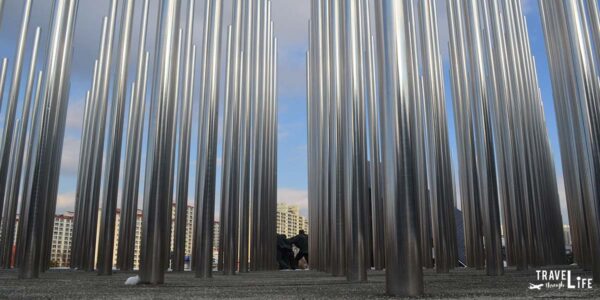Snowcapped mountains surrounded the city. Winter was certainly in the air, with a front promising more precipitation to most of Korea for the weekend. A visit to the Gwangju 518 Memorial in Sangmu District placed my thoughts on a different time and situation in Korea. Known by so many different names, this struggle for human rights started South Korea on a path towards a more peaceful existence. My move to Gwangju was akin to re-enrolling in school, forcing a reformation of my thoughts on this part of Asia.
Gwangju 518
This Gwangju travel guide is part of our series on South Korea Travel and East Asia Travel. It was originally created on December 19, 2014. It has been maintained and updated (as of December 28, 2018) to reflect current viewpoints and travel trends.
Could we just sit by and do nothing while our neighbors and friends were being beaten and killed before our eyes? – Witness account, the May 18th Massacre. Taken from “The Kwangju Uprising – An Inside View,” Korean Studies 11 (1987), pp. 33-57.
I don’t remember the first time the Gwangju Uprising came up in conversation but the city’s fighting spirit became absolutely clear to me. Living a few bus stops away from Sangmu led to frequent revisits of a revolutionary tale. A trip downtown once led me to a rally against a free trade agreement that Korea was set to join with the United States. Some might look to Seoul’s Gwanghwamun Square as a mouthpiece for change in Korea but when there’s discontent in the southwest, Gwangju is where the fire burns brightest.
Upon leaving the city, I’d long wanted to see the 518 again and walk around. December in Gwangju offers gorgeous views of the mountains surround the city. Kids found a nice spot near the Memorial Statue to use a starting point for their sleds, though the bottom led to a dangerous-looking wall of bamboo trees. Friends strolled through the trails surrounding the center. Seeing such an important place in person and witnessing this park on such a sunny day couldn’t help me forget a much darker time in Korea once existed; distinct from the destructive war and colonial period before.
The 1970s started Korea’s Han Miracle but also continued dictatorship and constant rewrites (0r abuses) to the already fragile constitution. In some places like Gwangju, the times meant martial law and lack of freedom. Students and workers alike grew restless, choosing to fight for something they’d yet to taste – Democracy. It all came months after Korea’s most famous (or infamous) president/dictator was assassinated and power was moving to yet another military strongman.
Students and citizens had long been demonstrating for their rights but the situation erupted into bloodshed starting on May 18th, 1980. Who started the violence? Claims differ depending on the storyteller but at least 200 people died during the standoff. Protestors held sticks and stones at best while the military brought guns and bayonets. Lives were taken and the military eventually suppressed the protestors but the spirit of Gwangju kept churning. The Gwangju 518 Memorial serves as a reminder of that but for further proof, one just needs to go and see the city in person. Gwangju doesn’t allow its citizens and even visitors a chance to forget.
Memories of that day surround the city almost like Mt. Mudeung guards it from ill will. Even during a recent visit, songs continue to ring for newer causes. This time, they demand answers and action from the government regarding the tragic Sewol ferry disaster. Protestors charge through the downtown alleys at night. Peaceful yet still passionate, their voices hope to change some big problems that I don’t understand as an outsider. That fight for change has always been here and will never go away.
“The (G)wangju Incident is widely considered to be a watershed in modern Korean politics.” – Tim Warnberg.
Many people have covered the events surrounding May 18th and a ceremony is held every year to commemorate the events between that day and May 27th, 1980. The Gwangju May 18th Memorial Foundation also awards a prize for Human Rights, with notable winners including Aung San Su Kyi of Myanmar. The Gwangju 518 movement’s importance is crucial to the Korea that we know today and honestly, I look at the struggle as a gift given to the Korean people. The Gwangju 518 Memorial stands as a testament to the fight and spirit that lives on in Gwangju. I hope that it never dies because if it does, trouble might be brewing ahead.


Wow, very cool. I haven’t been able to tour around Gwangju yet, but it’s high on my list. I didn’t realize it was a city with so much history.
I definitely recommend a visit to Gwangju if you get the chance. It’s a city full of history, culture, and food that tops any other region in Korea. Give it a shot if you can! Thanks for the comment, Neysha! I really appreciate it!
Thanks for the little history lesson, I didn’t know Gwangju was such a hot-spot for political unrest in Korea. It’s weird to think how new their democracy is. South Korea has come so far so fast, but they still have things to improve. A good friend of mine was very disenchanted with the government by the Sewol disaster, I’ve never seen someone so deeply affected by something like that. I know her sentiments are shared, it will be interesting to see if that will be big enough catalyst to inspire a change.
Yeah, it’s a frustrating place and one that we easily turn off. The people here (especially in Gwangju and Jeolla) are even more so, as they’ve long been ignored by the people in power. The Sewol has been a tough time for those affected and even unrelated people who want answers. The people in Gwangju don’t really like the current government and will probably never be satisfied as long as they are the minority. It’s an interesting place, for such a small country.
Thanks, as always, for your kind and thoughtful comments Nathan. I look forward to hearing from you again!
I haven’t made it to Gwangju yet, but recently it has been popping up on my radar a a place I must venture to before I leave the country. Really thoughtful writing, and a good reminder to us that come here as visitors that the not too distant past was defined by war, and social and political unrest. It is often easy to forget as we get swept up in the beautiful landscapes, delicious foods, and the somewhat ‘privileged’ way of life granted to us here.
Lara, I really appreciate what you said there. We do live during a fortunate time here and because of that, it’s so easy to forget what was happening not too long ago. I truly hope you enjoyed the read and thank you for leaving such nice thoughts. Take care.
Okay, you’ve convinced me that if (when) I return to Korea for vacation, Gwangju will be at the top of the list for places I have to visit. Maybe if you’re still around you could give me a tour!
Awesome dose of history as usual.
Thanks Matt! You should definitely stop by. It might not be as flashy as the others, but Gwangju is my favorite city for so many reasons!
I never made it to Gwangju, and now I wish I had. What a beautiful way for the people to commemorate the lives lost. Thank you for bringing a bit of Korean history to our doorsteps. It’s important to remember!
Thanks so much! I have always enjoyed history and seeing travel through the lens of what happened before helps me better understand it. Hopefully you can make it back to Korea and visit Gwangju sometime. It’s a rapidly changing city but full of warm and kind people.
I really loved Gwangju – thanks for sharing a bit more of the story behind what happened there on 5/18. Stunning photos as always.
Thanks so much! I think of this place as special but I’m not sure if the rest of the country appreciates it as much. It’s kind of a firecracker, this region.
wow. and this I guess is something people generally have never heard about. Thanks so much for sharing Duke
The Gwangju 518 Memorial truly is a gift and a sobering reminder. It’s inspiring that they tie in a human rights award along with the memorial celebration! Way to keep the spirit alive….